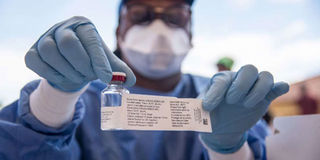What you need to know about Ebola

A nurse working with the World Health Organisation shows a bottle containing the Ebola vaccine in Mbandaka town, DR Congo, during the launch of a vaccination campaign on May 21, 2018. PHOTO | JUNIOR KANNAH | AFP
What you need to know:
- Ebola Virus Disease (EVD) is a rare and deadly disease most commonly affecting people and nonhuman primates (monkeys, gorillas, and chimpanzees).
Ebola Virus Disease (EVD) is a rare and deadly disease most commonly affecting people and nonhuman primates (monkeys, gorillas, and chimpanzees).
HOW DO YOU GET EBOLA?
The virus spreads through direct contact (such as through broken skin or mucous membranes in the eyes, nose, or mouth) with:
- Blood or body fluids (such as urine, faeces, saliva, sweat, vomit, breast milk, semen, and vaginal fluids) of a person who is sick with or has died from Ebola Virus Disease (EVD).
- Objects (such as needles and syringes) contaminated with body fluids from a person sick with EVD or the body of a person who died from EVD.
- Infected fruit bats or nonhuman primates (such as apes and monkeys).
- Semen from a man who recovered from EVD (through oral, vaginal, or anal sex). The virus can remain in certain bodily fluids (including semen) of a patient who has recovered from Ebola, even if they no longer have symptoms of severe illness.
THINGS TO NOTE:
- When someone gets infected with Ebola, they will not show signs or symptoms of illness right away. The Ebola virus CANNOT spread to others until a person develops signs or symptoms of EVD.
- After a person infected with Ebola develops symptoms of illness, they can spread Ebola to others.
- Additionally, Ebola virus usually is not transmitted by food unless in areas where people eat bushmeat.
EBOLA SYMPTOMS
Symptoms may appear anywhere from two to 21 days after contact with the virus, with an average of eight to 10 days. They include:
- Fever
- Severe headache
- Muscle pain
- Weakness
- Fatigue
- Diarrhoea
- Vomiting
- Abdominal (stomach) pain
- Unexplained haemorrhage (bleeding or bruising)
AVOID
While in an area affected by Ebola, it is important to avoid the following:
- Contact with blood and body fluids (such as urine, faeces, saliva, sweat, vomit, breast milk, semen, and vaginal fluids).
- Items that may have come in contact with an infected person's blood or body fluids (such as clothes, bedding, needles, and medical equipment).
- Funeral or burial rituals that require handling the body of someone who died from EVD.
- Contact with bats and non-human primates or blood, fluids and raw meat prepared from these animals (bushmeat) or meat from an unknown source.
- Contact with semen from a man who had EVD until you know the virus is gone from the semen.
HOW IS EBOLA DIAGNOSED?
An exposure may include contact with:
- Blood or body fluids from a person sick with or who died from Ebola.
- Objects contaminated with blood or body fluids of a person sick with or who died from Ebola.
- Infected fruit bats and primates (apes or monkeys).
- Semen from a man who has recovered from Ebola.
HOW IS EBOLA TREATED?
When diagnosed early, basic interventions can significantly improve the chances of survival. These include:
- Providing fluids and electrolytes (body salts) through infusion into the vein (intravenously).
- Offering oxygen therapy to maintain oxygen status.
- Using medication to support blood pressure, reduce vomiting and diarrhoea and to manage fever and pain.
- Treating other infections, if they occur.
PREVENTION
- Avoid areas of known outbreaks.
- Wash your hands frequently.
- Avoid bushmeat.
- Avoid contact with infected people.
- Follow infection-control procedures.
- Don't handle remains.
SOURCES: Centre for Disease Control and World Health Organisation





